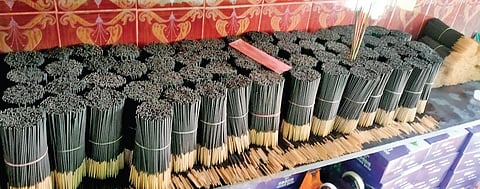Student turns floral waste into incense sticks in Odisha
BERHAMPUR: The dry flowers from temples, functions and households, which used to land up in dump yards have got a new lease of life, thanks to 20-year-old Sibaa Patra. He has turned the waste into fragrance and more importantly, a employment opportunity for womenfolk in his village. An initiative that started during the lockdown as a ‘best from waste’ experiment for Sibaa, is today providing livelihood opportunities to 10 women of his village Podingi under Hinjili block.
A Plus Three final year student of Hinjilicut Science College, Sibaa has set up an incense making unit at his house and with the help of the village women he manufactures and markets them under the brand name of ‘Maha Shakti Agarbati’. The incense sticks are natural and free from any chemical or harmful substance. When the college closed down owing to the pandemic, Sibaa had a lot of free time and wanted to use it constructively.
While browsing through the internet, he came across the method of using dry flowers to make incense sticks. Deciding to experiment with the idea, he began collecting dry flowers from across the village.
“I found out that flowers contain carbon elements which act as a burning material. When binded with oil, the powder generated from dry flowers can be hand rolled and used as incense sticks emanating fragrance,” he said. The beginning was small. Sibaa began spending time observing rituals and usage of flowers in temples which were closed to the public then.
He noticed that while all other waste products were dumped elsewhere, used flowers were considered auspicious and hence, put under a tree or in a water body. “I requested the priests to allow me to collect the flowers and they happily agreed”, said Sibaa. He borrowed a small amount of money from his father Laxman Patra, a sharecropper, to buy bamboo sticks, oil and polythene packets to prepare and package the sticks. The results were encouraging and he sold the incense sticks in his village. The product sold well and people began placing orders for his incense sticks. This was in November.
He then decided to scale up production and roped in some women of his village for the work. Currently, 10 women are engaged in making incense sticks at Sibaa’s unit and each earns Rs 5,000 a month. With one kg of dry flowers, he prepares four packets, each containing 300 sticks. Every packet sells at Rs 90. In the last two months, Sibaa’s unit has produced 1,500 packets.
Considering the good quality, the incense sticks are also high in demand in Hinjili and nearby markets. After meeting all the expenses, he makes a profit of around Rs 30,000 a month. Recently, Sibaa met the Hinjili block officials and requested them to provide him financial aid to procure a rolling machine and other equipment which will ease the process and increase production.

